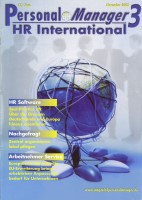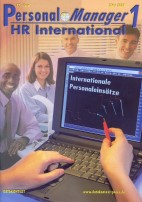

Für die Zeitschrift
Personal.Manager - HR
International ![]() hat
Alexia Petersen eine regelmäßige Kolumne geschrieben. Diese
zwölfteilige Artikelserie,
English in the job,
richtet sich an Mitarbeiter im Personalmanagement, die ihre
Englischkenntnisse verbessern möchten. Dabei wird neben verschiedenen
sprachlichen Aspekten insbesondere die Funktion des Englischen als
Werkzeug in der interkulturellen Kommunikation betont.
hat
Alexia Petersen eine regelmäßige Kolumne geschrieben. Diese
zwölfteilige Artikelserie,
English in the job,
richtet sich an Mitarbeiter im Personalmanagement, die ihre
Englischkenntnisse verbessern möchten. Dabei wird neben verschiedenen
sprachlichen Aspekten insbesondere die Funktion des Englischen als
Werkzeug in der interkulturellen Kommunikation betont.

|
Ausgabe 1/2002 (Oktober 2002): Do you still speak "German-English"? I have a little radio I listen to whenever I am puttering around in the kitchen. It is set perpetually at 648 medium wave for the BBC World Service. The reception is, on the best of days, never completely free of static but adequate enough for news information to filter through. However, when I want to listen to Mozart, I don't hang around the kitchen but move to the heavy duty hi-fi stereo hardware in the living room that is capable of faithfully re-producing the subtle nuances and light tonal gradations of the original performance. What, you might be asking yourself, does this have to do with language learning? Communication in English for professional use benefits qualitatively from a similar fine-tuning or upgrading from "lo-fi" to "hi-fi" language skills. |

|
Ausgabe 1/2003 (April 2003): "I'm not too happy": Hitting the Right Tone in English The most defining feature of the English language, according to my students, is politeness. In class, students compile neat lists of "polite English", and labour to make sentences sound "less German". Yet a typically English sentence like "That's not entirely incorrect" always creates some confusion. Is it, or isn't it actually polite? |

|
Ausgabe 2/2003 (September 2003): A Fresh Look at Verb Forms (1) English verb forms are like a special set of "vocabulary". Learning to use the different verb forms means being able to express yourself more clearly and effectively. Here is Part One of a review of when and how to use the most common verb forms in business communication. |

|
Ausgabe 3/2003 (November 2003): A Fresh Look at Verb Forms (2) Do you know when you should say "I did" and when you should say "I have done"? Using the simple past and present perfect correctly is often difficult for German speakers because spoken German tends to use only one past verb form (the Perfekt) to talk about the past. In contrast, the simple past and present perfect are examples of how English verb forms work like a basic set of vocabulary. Learning to use them correctly is also key to beginning and developing fluid dialogue. Here is Part Two of our review of the English verb forms. |

|
Ausgabe 1/2004 (April 2004): No Big Talk Without Small Talk The first thing you need to know is that the "small" in "small talk" has nothing to do with its importance. When it comes to social interaction in English, it is a vital lubricant. Much more than chit-chat about the weather (though it is always a good place to start!) to kill time, it opens communication and explores the common ground between strangers. In intercultural business communication, it signals positive interest in a potential partner. Doing small talk well, however, requires more than just language skills. Here is a look at how culture, more than language, influences how well you do small talk, and how Germans can learn to do it more effectively. |

|
Ausgabe 2/2004 (Juli 2004): Must you read this article, or Should you read this article? How to give instructions instead of commands Businesspeople in North America and Great Britain consider a friendly and considerate tone to be very important in business communication, and prefer a more collegial to an authoritative tone, especially when directives are critical. In this instalment, we'll look at what German speakers of English have to be careful of when giving instructions or directions. |

|
Ausgabe 3/2004 (Oktober 2004): Communicating about problems When it comes to expressing disagreement or contradictions, German and English speakers tend to strike quite different tones. While German dialogue tends to be content-focussed, especially in business communication, English is more relationship-oriented when it comes to communicating about problems. In this instalment, we will look at how to communicate clearly and effectively about problems in English. |

|
Ausgabe 4/2004 (Dezember 2004): Getting acquainted with false friends Learning new vocabulary is an unavoidable labour of language learning. To complicate matters, English and German share many words that look and sound deceptively alike but may mean very different things. In this instalment we take a closer look at the hidden pitfalls in using false friends. |

|
Ausgabe 1/2005 (März 2005): The Language of Inflation You are the dinner guest of your Indian business partner at his home in Delhi. The table is piled high with food and drink and throughout the meal your host has repeatedly heaped your plate and refilled your glass. You really cannot eat another bite. Your host, however, continues to insist that you eat more. What do you do? |

|
Ausgabe 2/2005 (Juni 2005): When "Thinks on His Feet" meets "Plays by the Book": Encountering Idiomatic English in Business Idiomatic expressions are very common in business English, and English in general. Not only can they be difficult to understand, though many of the individual words are easy, but often the problem lies in the different cultural values embedded in the expressions. Not surprisingly, idiomatic language doesn't always translate, and often reveals how wide the cultural gap is between two business worlds. Here are some typical points of communication clash between Germans and North Americans. |

|
Ausgabe 3/2005 (September 2005): Making Appointments A routine business day is often a patchwork of meetings. Especially in time-pressed North America and Northern Europe where "time is money" and micro-managed as a valuable resource, nothing gets done without meetings. Especially in German business, the more important the matter, the more in advance these meetings have to be planned. Here we take a look at some useful expressions for proposing, confirming and rescheduling meetings, while at the same time keeping in mind that fixed agendas and appointments have a way of folding into the "rubber time" that flows through many other cultures. |

|
Ausgabe 4/2005 (Dezember 2005): Do you just speak a language well, or communicate effectively with a culture? The facts and figures of daily business are neutral, but the people who discuss them and make the decisions are decidedly not. Business is done entirely in a cultural context, and business people carry with them a heavy load of baggage. Cross-cultural miscommunication, however, doesn't always have to end problematically, though this can often be the case. Language skills, as we have seen in this column, are only one tool of intercultural communication. As this series draws to a close, the author re-visits some issues of international business communication that are frequently overlooked, and poses again the key question she began with: what are some problems that can arise even where technical language skills are "perfect"? |

|
Ausgabe 2/2006 (Juli 2006): Communicating with Canadians - Comfortably Familiar, Surprisingly Challenging International business, especially where joint ventures or prolonged negotiations are involved, is fraught with difficulties. Even between such traditionally compatible business communication cultures as Germany and Canada, the presence or absence of intercultural communication skills can make or break a deal. In the least, incalculable benefits and potential can be wasted, and opportunities missed. Germans with a commitment to doing business with Canadians need to know not only what to expect but, more importantly, why it is that way in order to asses how they should react. |
| Letzte Änderung dieser Seite: 07.01.2007 |
Copyright © 1999-2019 A. & S. Petersen www.aspetersen.de |